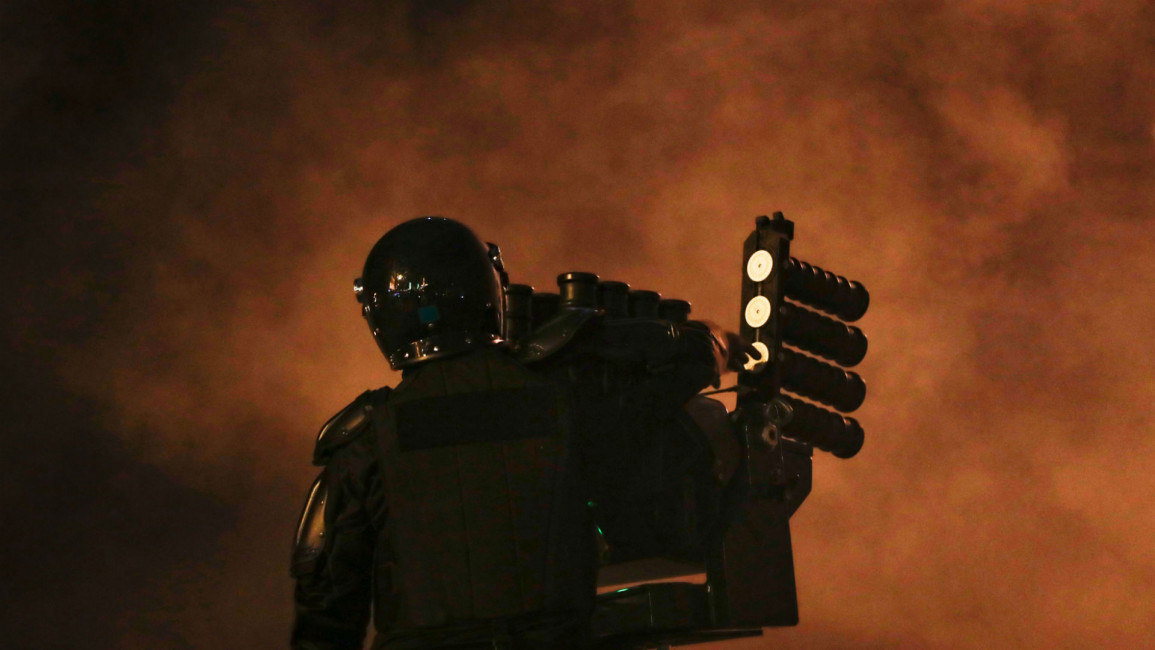Dozens injured in violent crackdown on Lebanon anti-government protests
The sound of ambulance sirens rang out across Beirut as the Red Cross reported 80 wounded had been taken to hospital and 140 more were treated on site.
On Saturday evening, fire tore through protest tents in an iconic square in central Beirut. It was not immediately clear what caused the blaze.
The protest movement rocking Lebanon since 17 October revived this week as a deepening economic crisis increases pressure to form a new government.
No progress appears to have been made towards finalising the cabinet, which protesters demand be comprised of independent experts and exclude all established political parties.
Earlier, marches had intended to converge on the city centre from across Beirut.
Read more: Businesses struggle as Lebanon's economic crisis continues
But near parliament, dozens of protesters threw rocks and large plant pots at police guarding the road leading up to the institution. Others charged police lines with traffic signs and metal barriers.
Twitter Post
|
Security forces behind the barricades responded with water cannon and tear gas to disperse the crowds.
"A direct and violent confrontation is taking place with anti-riot police at one of the entrances to parliament," the Internal Security Forces said on Twitter.
"We ask peaceful protesters to keep away from the site of the rioting for their safety."
They published photos of several wounded policemen and a video showing pillars stripped of their tiles, reportedly to be thrown at security forces.
An AFP photographer saw young men uproot parking metres. He also saw around 10 people faint from tear gas inhalation.
'Popular anger'
A 23-year-old woman named Maya said she was protesting because politicians seemed to be ignoring demands for an overhaul of the old political class.
"I'm here because after more than 90 days in the streets, they're still squabbling over their shares in government... It's as if they didn't see our movement," she told AFP.
"Popular anger is the solution," she said.
Forming a cabinet is an often convoluted process in Lebanon, where a complex system seeks to maintain balance between the country's many political parties and religious confessions.
But protesters say they want to scrap the old system, and demand a new government of impartial technocrats to address mounting economic woes, including a severe liquidity crisis.
President Michel Aoun called on Twitter for the security forces to protect peaceful protesters, but prevent "vandalism".
Outgoing Prime Minister Saad Hariri meanwhile condemned what he called a "suspicious and crazy scene", blaming "infiltrators".
This week public anger has been directed at banks, with branches in the capital's Hamra district vandalised following widely unpopular limits on withdrawals and transfers.
Dozens were detained for several nights after clashes on Tuesday and Wednesday, before being released.
Human rights groups denounced the arrests and what they described as unacceptable violence against largely peaceful protesters.
The last government stepped down under pressure from the street on 29 October, but has remained in a caretaker capacity until a new cabinet is formed.
Political factions that agreed on 19 December to appoint former education minister and professor Hassan Diab as the new premier are now disagreeing over proposed ministers.
The World Bank has warned that the poverty rate in Lebanon could rise from a third to half of the population if the political crisis is not solved quickly.



